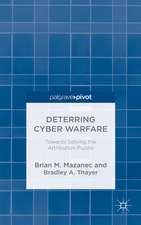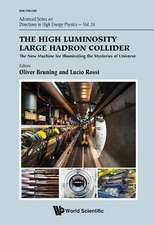The Evolution of Cyber War: International Norms for Emerging-Technology Weapons
Autor Brian M. Mazanecen Limba Engleză Hardback – 31 oct 2015
Former secretary of defense Leon Panetta once described cyber warfare as “the most serious threat in the twenty-first century,” capable of destroying our entire infrastructure and crippling the nation.
Already, major cyber attacks have affected countries around the world: Estonia in 2007, Georgia in 2008, Iran in 2010, and most recently the United States. As with other methods of war, cyber technology can be used not only against military forces and facilities but also against civilian targets. Information technology has enabled a new method of warfare that is proving extremely difficult to combat, let alone defeat.
And yet cyber warfare is still in its infancy, with innumerable possibilities and contingencies for how such conflicts may play out in the coming decades. Brian M. Mazanec examines the worldwide development of constraining norms for cyber war and predicts how those norms will unfold in the future. Employing case studies of other emerging-technology weapons—chemical and biological, strategic bombing, and nuclear weaponry—Mazanec expands previous understandings of norm-evolution theory, offering recommendations for U.S. policymakers and citizens alike as they grapple with the reality of cyber terrorism in our own backyard.
Already, major cyber attacks have affected countries around the world: Estonia in 2007, Georgia in 2008, Iran in 2010, and most recently the United States. As with other methods of war, cyber technology can be used not only against military forces and facilities but also against civilian targets. Information technology has enabled a new method of warfare that is proving extremely difficult to combat, let alone defeat.
And yet cyber warfare is still in its infancy, with innumerable possibilities and contingencies for how such conflicts may play out in the coming decades. Brian M. Mazanec examines the worldwide development of constraining norms for cyber war and predicts how those norms will unfold in the future. Employing case studies of other emerging-technology weapons—chemical and biological, strategic bombing, and nuclear weaponry—Mazanec expands previous understandings of norm-evolution theory, offering recommendations for U.S. policymakers and citizens alike as they grapple with the reality of cyber terrorism in our own backyard.
Preț: 256.26 lei
Nou
Puncte Express: 384
Preț estimativ în valută:
49.04€ • 53.43$ • 41.32£
49.04€ • 53.43$ • 41.32£
Carte tipărită la comandă
Livrare economică 23 aprilie-07 mai
Preluare comenzi: 021 569.72.76
Specificații
ISBN-13: 9781612347639
ISBN-10: 1612347630
Pagini: 352
Ilustrații: 13 tables, 1 graph
Dimensiuni: 152 x 229 x 33 mm
Greutate: 0.64 kg
Editura: Potomac Books Inc
Colecția Potomac Books
Locul publicării:United States
ISBN-10: 1612347630
Pagini: 352
Ilustrații: 13 tables, 1 graph
Dimensiuni: 152 x 229 x 33 mm
Greutate: 0.64 kg
Editura: Potomac Books Inc
Colecția Potomac Books
Locul publicării:United States
Notă biografică
Brian M. Mazanec is an assistant director for defense capabilities and management with the U.S. government and an adjunct professor in the School of Policy, Government, and International Affairs at George Mason University. He is the coauthor of Deterring Cyber Warfare: Bolstering Strategic Stability in Cyberspace, and his work has appeared in Strategic Studies Quarterly, the National Cybersecurity Institute Journal, Comparative Strategy, Politics and the Life Sciences, and the Journal of International Security Affairs.
Cuprins
List of Illustrations
Preface
Acknowledgments
List of Abbreviations
Introduction
1. General Norm Evolution Theory
2. Norm Evolution for Chemical and Biological Weapons
3. Norm Evolution for Strategic Bombing
4. Norm Evolution for Nuclear Weapons
5. Norm Evolution Theory for Emerging-Technology Weapons
6. Predicting Norm Evolution for Cyber Warfare
Conclusions and Recommendations
Appendix: Background on Cyber Warfare
Notes
Bibliography
Index
Recenzii
"Mazanec certainly has the credentials and background to examine this topic. . . . Well written from start to finish."—Lt. Col. George Hodge, Military Review
“Will norms evolve for cyber warfare analogous to those . . . that have helped keep the world free from the use of nuclear weapons since 1945? This thoughtful and careful work parses this hugely important question with care and creativity. Bravo.”—R. James Woolsey, former director of the Central Intelligence Agency and chairman of the Foundation for Defense of Democracies
“Dr. Mazanec’s pioneering work on cyber norms fills a void in the nascent canon of cyber-conflict knowledge and sets a path forward for further research. Informative and instructive for today’s policymakers.”—Bob Gourley, former chief technology officer of the Defense Intelligence Agency and the first director of intelligence at the Joint Task Force on Computer Network Defense
“Brian Mazanec has produced a stellar work by creating a set of norms and then applying them across different evolutions of weapons platforms.”—Jeffrey Carr, CEO of cyber security firm Taia Global, Inc., and author of Inside Cyber Warfare: Mapping the Cyber Underworld
“The Evolution of Cyber War is a significant contribution to the required canon for anyone interested in understanding this new prospective weapon of mass destruction.”—Keith Payne, former deputy assistant secretary of defense for Forces Policy and current president of the National Institute for Public Policy









